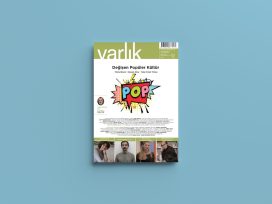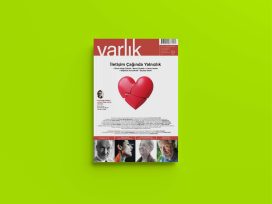Abstracts Varlik 7/2005
BULENT USTA
An idly written article
The contrast between the virtuous idleness involved in becoming a free human being and the “conspicuous” or “consumptive” idleness imposed by capitalism resembles the Kafkaesque encounter between the idleness seen as the source of all evil and the idleness seen as the crown of all virtue.
RAHMI G. OGDUL
The geometry of laziness
In his book Lazy Men and Dirty Work (1977), Alexandr Berkman defined laziness as the state of being in the wrong place. He was probably the first to talk about the geometry of laziness: “What we call a lazy person is generally a square peg in a round hole; that is, the right man in the wrong place.”
KURSAD KIZILTUG
The struggle for time
The primary reason for rejecting or criticizing the modern form of work is the transformation of work – from the self-activity of a person to create value into a monotonous activity, fulfilling the demands of either the capitalist or the state, under the pressure for survival. Thus man becomes an object rather than an entity with a voice in determining their own activity… The goal of all revolutionary utopias is to transform life away from necessities and into freedoms, to increase the pleasing diversity of life.
VECDI CIRACIOGLU
The wise vagabond
Those people who are labeled as vagabonds (loafers, bums) by our society today should not be confused with those fake stage actors of modern cities devoid of any philosophy, forcibly generated by society, and unable to proliferate by their own internal dynamics… The creator, when He created the human being on this earth, probably knew full well he had given life to a glorious wise vagabond… The vagabond characteristics of man are, beyond anything, his most promising features.
NALAN BAHCEKAPILI
The “coffeehouse”: A setting for idleness, a public space, heterotopia
In the emergence and popularization of coffeehouses, we can see elements of change in the domain of social interaction and symbols. These could be the cause of the insistent opposition towards coffeehouses from the very beginning… according to Dufour (a seventeenth-century observer) the subject of most of the patrons’ comments and critical remarks was political affairs.
NIHAT ATES
A talk with Kemal Özer
Poetry dealing with current affairs is usually misperceived as talking about day-to-day experience. What has to be underlined, however, is that it is a way of handling currency. Writing about life is essentially a way of approaching things. Whatever time-segment the written word talks about, it is about carrying the subject to the present, talking about it in the present. When you consider the written word in this way, you can look to the past or see the future in the present.
HASAN EFE
The merging of “you” and “I” in Kemal Özer’s poetry
Kemal Özer’s poetry reminded me of the “Cloud in love”. Perhaps it was due to the effect of words and sounds. A meeting that envelops your heart, makes two hearts flow into each other. Truly so! You start reading his book with “Greeting Tomorrow”, and finish with “End of Summer”. You see the “borderless faces of two countries” in this meeting; “it will almost fly away if we don’t place a stone above”, this “Meeting in Love”.
METIN CELAL
The narrow streets and comforting homes of Necatigil
As Mehmet H. Do?an observes in his “Introduction to Necatigil’s poetry”, Necatigil, when he says “I”, always refers to you and me and the others, that is, to all the society’s poor and those becoming impoverished, rather than to an isolated being with his own special problems.
ATILLA BIRKIYE
A humanist “Blue Voyager”
Azre Erhat is a blue voyager, but her voyage is not limited to this (the coastal waters of the Aegean); it is about sailing to the past, to cultural values, in particular to Anatolian cultures, civilizations. In her essays and studies, she has attempted to relate the cultural values of the Anatolian people to past civilizations of Minor Asia; by translating the classics, and embracing the ideology of the Republic, she has contributed to the modernization and westernization movement.
MUSTAFA SERIF ONARAN
Seeing reality through words
Reading Dursun Akçam, we see a different medium created through the use of unaccustomed word values. Knowing the language, mastering it, hinges upon creating a form that would make the medium to be narrated credible. Only the writer who has grown up in a certain environment with those words, who incorporates those word values into the natural flow of his narrative, can succeed in presenting realty through words.
TUGBA YILDIRIM
The kaleidoscope of the coquette: Sweet Betus
Described mostly by the narrative of other characters in the novel, Sweet Betus has dressed up everything about herself with a fairy tale – like cloak, reflected and colored and distorted all her doings according to her wish – just like a kaleidoscope does. Aziz Nesin has thereby combined many flaws that can be seen in a society within the context of a single character’s problematic psychological make-up.
***
Introduction to the 2005 Yasar Nabi Nay?r Award for Young Writers
The ongoing effort, since the beginning of this literary journal in 1933, to recruit new writers and poets for Turkish literature has resulted once again in the presentation of new names to the readership of literature. The interest in the 15th competition for short story writers and poets was high as usual and we were pleased to note that the quality of manuscripts sent has been rising with each year. This year the award for story writing went to Mehmet Erkan, and for poetry to Alper Gencer.
***
A talk with Alper Gencer
Instead of talking about “other things” about myself, I’d prefer my “other” aspects, not having received the credit they deserve, to talk about me. For one always seeks to say something about “himself”. I think all those describable aspects of myself you have enumerated are really not what I have told, but what have been told to me… The reason why I entered this competition is to become “famous”… It is rumored that Victor Hugo, before he became famous, is supposed to have exclaimed: “Oh fame, if I can only get hold of you!”… Further, the word “meshur” (famous) is derived from the word “sehir” (city). I am from a small town in the countryside and us small townies have always desired to become famous, in that sense. We are full of curiosity about the big city, and as soon as we arrive there, we start seeking consolation in what we have left behind… We realize with sorrow, once we are standing on the asphalt, that it has been the earth that has kept us on our feet.
***
A talk with Mehmet Erkan
My biggest concern is writing. Except when I am working, or eating, or sleeping, I find myself penning down something. People around me of course get upset; some even accuse me of being anti-social. Not that these accusations flatter my ego. It is like getting pleasure out of pain. I smile at them, as if this were the type of man I want to be. Different sensations, these are. One cannot avoid getting caught in one’s instincts, desires, ego.
MEHMET NURI YARDIM
A short journey into the world of literature with Tosuner
An advertisement in the book supplement of a daily had shocked literary circles and was talked about for months. It was an emotional declaration by a writer, who was looking for a publisher with integrity and character, who would show respect to writers. The advertisement was placed by one of the well-known writers of Turkish literature, with many awards to his name: Necati Tosuner.
SUKRAN KOZALI
The author Oguz Atay, as studied by Yildiz Ecevit
The introductory chapter in the latest work of Yildiz Ecevit, where she studies the late writer Oguz Atay yields important hints about Atay. She corresponds with the writer she studies through his texts, as if she is getting an endorsement from him. In this there is an accumulation of affection, and perhaps admiration for the writer.
FERIDUN ANDAC
From writing to commentary: Writing as a way of acquiring a critical point of view
Where does the journey of the writer start? The first response to such a question is: From within the writings of others. It certainly is important to go on that journey. Those readings are the starting point of writing. We just read, without knowing, sometimes without understanding, even without seeing the future…
CIGDEM SEZER
The poem of risk taking: “There it is”
The poem not only revolts against those things accepted as given, but also contains the paradoxical reality of love at the crossroads of the spirit and body. The reality I am referring to is not about what love is or is not, to what extent it can be experienced, etc. Since whatever we call “reality” is not absolute, and can be a reflection or even illusion, why shouldn’t love be part of it! Even if we assume love is an illusion, how are we to name the process lived till the moment we will say this? As “love” of course. Uzunbay’s poem is, among other things, a poetic rendering of this process, a rendering containing the past, glorifying the present, and suggesting the future.
MEHMET RIFAT
From the history of criticism – Barthes: On the subject of Sartre and Existentialism
I will dedicate a few columns to critiques, courses, and interviews in the final years of his life, in particular to the courses he gave at the College de France on the “Preparation of a Novel”, quoting passages from those lectures. I will also present a translation of a short but very important critical essay on Proust in Magazine littéraire (1979) and finally of one of his last interviews (published in the same magazine 13 years after his death in 1980).
KRIMONOLOG DR. KEMAL SAHINGOZLU
Literary detective
A response to an article by a colleague (Semih Gumus) in a daily newspaper, charging the author with duplicity in his column in the previous issue of Varlik (June 2005), where this author criticized the award given to the daughter (Ayse Sarisayin) of the late Behcet Necatigil (a much respected man of letters) by a jury composed of Semih Gumud and others such as the poet Hilmi Yavuz, with close ties to the family of Necatigil.
Published 8 July 2005
Original in Turkish
Contributed by Varlik © Varlik
PDF/PRINTNewsletter
Subscribe to know what’s worth thinking about.



